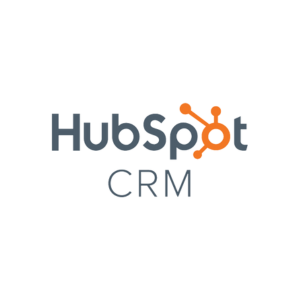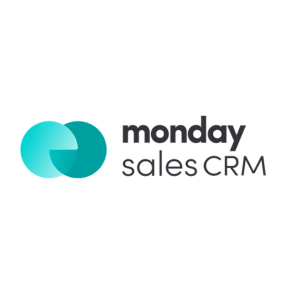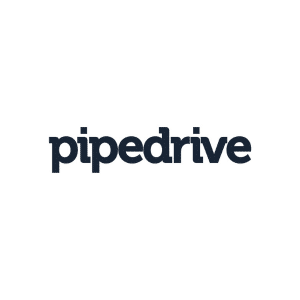Are you a small or medium-sized business (SMB) looking for a customer relationship management (CRM) solution that empowers you to manage and grow your customer base effectively?
If your CRM doesn’t work for your business, it could have disastrous consequences for your company. You could miss valuable customer data or lose leads, customers, and sales opportunities.
I’m here to help! I’m AJ, and I have used countless CRMs while building and expanding my business throughout my career!
Recently, I sold the company for a seven-figure exit and started Small Business Bonfire (SBB) to assist other entrepreneurs and small business owners in creating their own business success.
That’s why the SBB team and I reviewed the best small business CRM software examples that can help SMBs like yours make better decisions, stay organized, and grow faster.
If you’re ready to nerd out, let’s dive in!
Key Takeaways
-
CRMs can help improve sales and marketing efforts -
There are many different examples of CRM software -
Sales teams can use CRM tools to track the entire sales cycle -
A CRM tool can help SMBs reach their target audience more effectively
SBB Featured Partners
CRM Example 1: HubSpot CRM
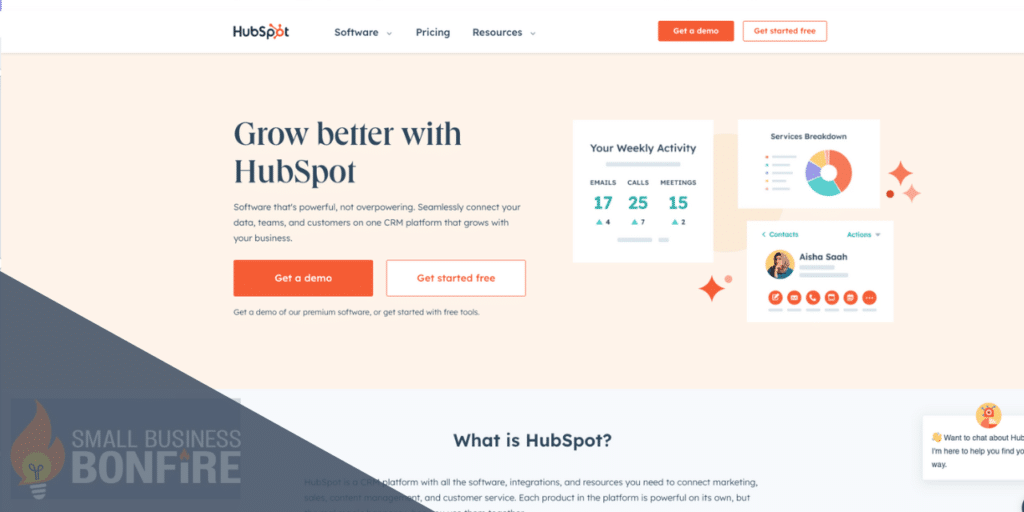
Let’s begin with our top pick, HubSpot CRM!
What Is HubSpot CRM?
HubSpot CRM is a suite of software hubs that are designed to help optimize and manage your business operations in one centralized location.
It offers the following products for SMBs:
- CMS Hub
- Sales Hub
- Service Hub
- Marketing Hub
- Operations Hub
Whether you run a small business or a mid-sized enterprise, this cloud-based software solution can help you streamline your sales and marketing processes and boost your bottom line.
Check out our extensive HubSpot CRM review if you would like to learn more about this CRM!
HubSpot CRM Key Features
HubSpot CRM is a comprehensive solution offering various essential features and tools developed specifically for SMBs.
Some of these key features include the following:
- Live chat
- Sales pipeline
- Email marketing
- Content creation
- SEO optimization
- Lead management
However, it is vital to note that the features you will receive will depend on the HubSpot hub you choose.
Therefore, it is critical to consider which features and tools are the most important for your SMB before making a final decision.
HubSpot CRM Pros and Cons
Throughout our testing, the SBB team and I noticed some significant pros and cons while using this platform.
Pros:
- User-friendly interface
- A free forever plan is offered
- Many third-party integrations
Cons:
- The higher-tiered plans are more expensive
- Limited customization options for some HubSpot hubs
Example of HubSpot in Use
Let’s look at how this CRM platform can be used in an SMB setting.
Say you own a small business specializing in selling custom-made furniture online, and you want to target more customers and increase sales of your products.
Using the free marketing tools within Hubspot CRM, you could:
- Optimize your website for better search engine rankings
- Create automated email campaigns that are tailored to your customer’s interests
- Design targeted ads on social media platforms, such as Facebook and Instagram
These are just a few ways you can leverage HubSpot CRM to power up your small business and maximize its reach and sales!
CRM Example 2: Monday Sales CRM
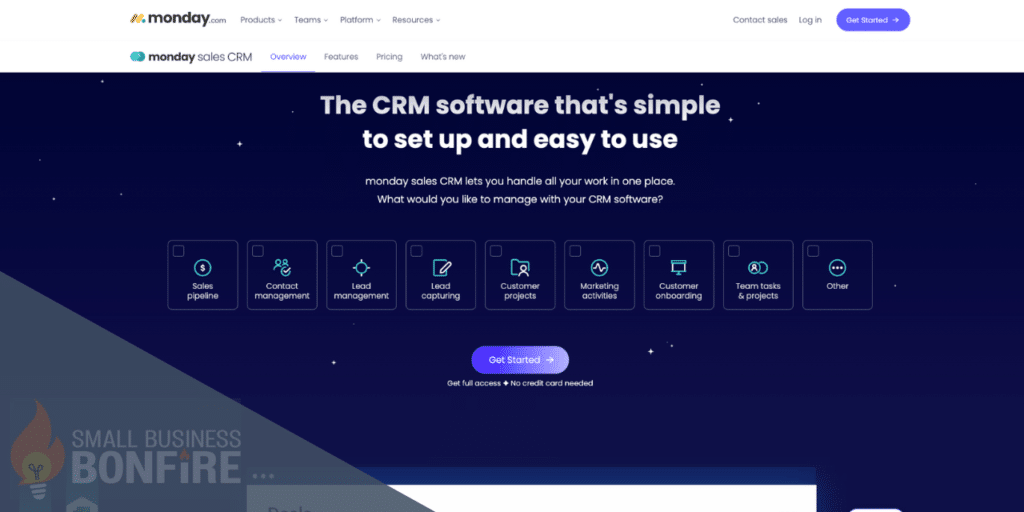
Next is our runner-up, Monday Sales CRM!
What Is Monday Sales CRM?
Monday Sales CRM is a software suite offered by Monday.com that is created specifically for sales teams looking to strengthen their overall sales performance and manage customer interactions more effectively.
The best part about this software solution (aside from its ease of use) is that it is included with Monday.com’s free forever plan, making it one of the more affordable CRM tools for small businesses on a tight budget.
However, users who need more advanced options will have to upgrade their plans to gain access to those features. Consider reading our complete Monday CRM review if you think this is the platform for your SMB!
Monday Sales CRM Key Features
This CRM enables small businesses to keep track of all customer relationships and the entire sales process in one place.
The software provides several essential features and tools, such as:
- Lead tracking
- Pipeline tracking
- Sales forecasting
- Sales automation
- Task management
- Contact management
Whether you’re a business owner or a manager of a group of sales reps, this sales management tool will help you stay on top of your game in a highly competitive industry by monitoring all your sales processes and activities.
Monday Sales CRM Pros and Cons
Additionally, our team noted some of the main benefits and drawbacks while testing this CRM platform.
Pros:
- 14-day free trial
- Built-in time tracking
- Fully customizable templates
Cons:
- Slow customer support
- Some advanced features are only available on high-tiered plans
Example of Monday Sales CRM in Use
Now let’s review how this platform could be an effective sales tool for SMBs.
For example, imagine you own a medium-sized business that sells high-end clothing in stores and online, and you need help tracking your customers’ orders to ensure they reach them on time.
Using Monday Sales CRM, you can:
- Create and assign customized tasks to your sales reps
- Track real-time sales performance with detailed analytics dashboards
- Set up automated notifications to customers when their order is shipped
- Enhance communication between your sales and marketing teams with integrated messaging channels
This CRM system can be a valuable asset for businesses like yours to keep your existing customers happy and satisfied with your products and services.
If you need an intuitive sales pipeline management platform that can help you amplify your sales process and provide better customer service, Monday Sales CRM is the perfect tool!
CMR Example 3: Pipedrive
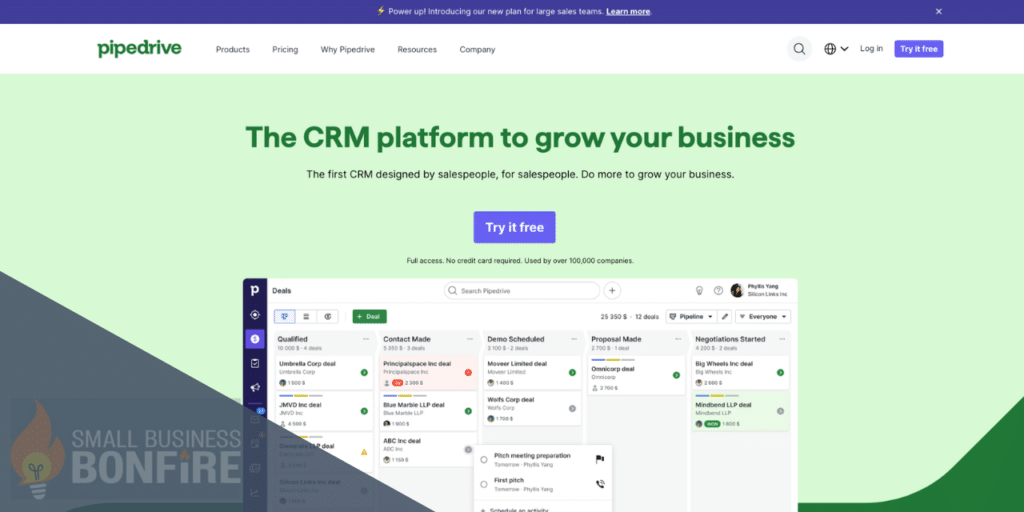
Now let’s discuss Pipedrive!
What Is Pipedrive CRM?
Pipedrive is an all-in-one CRM system that helps SMBs improve their overall business processes while providing a clear overview of their deals and contacts.
With this software, small businesses can easily:
- Track their progress
- Schedule follow-up tasks
- Collaborate with team members
Plus, it includes an easy-to-use interface, which makes it ideal for business owners who don’t have a dedicated tech team. Here is our Pipedrive review for more information about this CRM solution!
Pipedrive CRM Key Features
This powerful CRM solution is packed with features and functionality, making it the perfect choice for businesses looking to optimize their marketing and sales efforts without breaking the bank.
It offers many key features, including:
- Sales tracking
- Lead management
- Workflow automation
- Reporting & analytics
- Customer data management
No matter if you’re a solopreneur or part of a growing team, Pipedrive has everything you need to take your sales game to the next level!
Pipedrive CRM Pros and Cons
During our testing period, we discovered some main advantages and disadvantages of Pipedrive.
Pros:
- Easy-to-use platform
- Affordable pricing plans
- 14-day free trial available
Cons:
- No free plan
- Limited third-party integrations
- Limited customer service options are available
Example of Pipedrive CRM in Use
Next, let’s see how Pipedrive CRM could be implemented in an SMB.
Let’s say you own a small business that sells car parts and accessories to customers online, and you need help managing customer relationships and tracking your progress.
This CRM system can help you:
- Automate tasks with sales pipelines and workflows
- Organize contacts into groups and follow up on leads
- Improve the customer experience with email marketing tools
- Gain insight into customer behavior with comprehensive reports
Overall, Pipedrive is an excellent choice for SMBs looking for an efficient CRM tool to help them increase revenue.
CRM Example 4: Salesforce
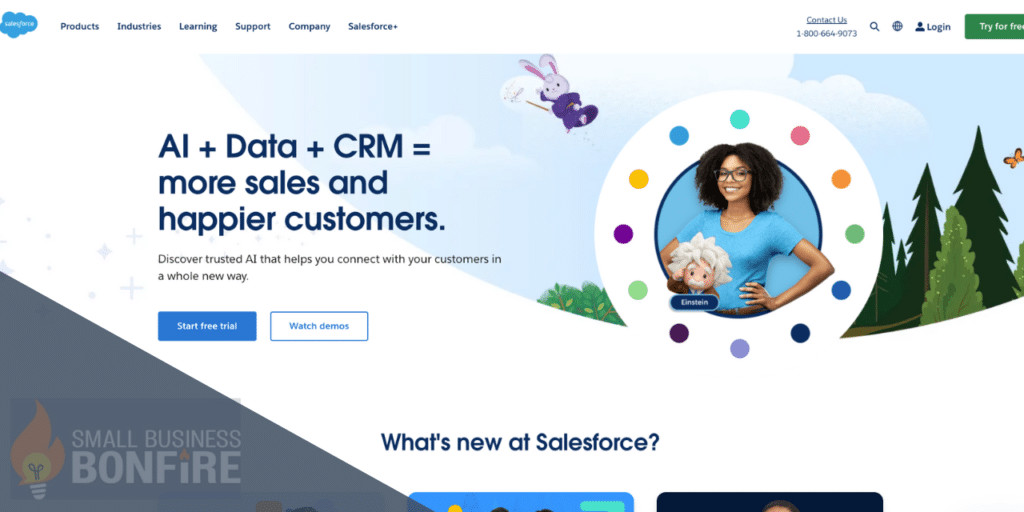
Following that, we have Salesforce!
What Is Salesforce CRM?
If you’re searching for an all-encompassing CRM solution, Salesforce won’t disappoint. It’s a cloud-based platform that is easy to scale and allows you to manage your business processes like customer service, sales, and marketing in one place.
Plus, with AI-powered features like Einstein Analytics and personalized recommendations, Salesforce CRM takes your business to the next level of effectiveness and efficiency.
Let’s dive deeper into what this software solution has to offer!
Salesforce CRM Key Features
Known as one of the world’s leading CRM solutions, Salesforce CRM offers various robust features with unmatched flexibility.
Some of the key features it provides are as follows:
- Lead tracking
- Project management
- Marketing automation
- Customer management
So, whether you’re a small startup or a large enterprise, Salesforce CRM has the tools to manage your customer relationships better.
Salesforce CRM Pros and Cons
As with all CRM solutions, using Salesforce has pros and cons.
Here are the main drawbacks and advantages the SBB team noticed during testing.
Pros:
- Highly customizable
- Offers a mobile CRM app
- Provides a 14-day free trial
Cons:
- A steep learning curve for new users
- Costly for customers with multiple contacts or users
Example of Salesforce CRM in Use
To better understand how this CRM system could be applied in an SMB, let’s look at how it can help support businesses like yours.
Pretend you own a medium-sized business that sells pet food and supplies, and you want to improve customer satisfaction and retention.
With Salesforce, you can:
- Track customer service tickets
- Create a detailed customer profile
- Engage customers with personalized campaigns and content
- Analyze customer feedback and behavior to optimize your services
Having an effective CRM system in place with Salesforce can help you stay ahead of the competition and boost customer loyalty.
CRM Example 5: Zoho CRM
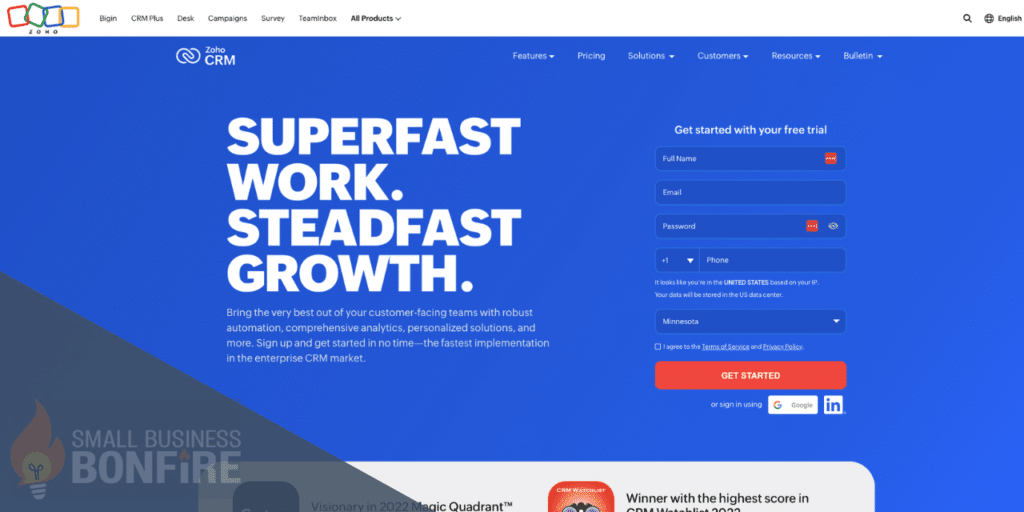
Continuing on, we have Zoho CRM!
What Is Zoho CRM?
Zoho CRM is a top-notch platform that provides SMBs with the tools they need to manage and analyze their customer interactions successfully.
As a cloud-based system, you can access your client data from anywhere so long as you have an internet connection.
It also integrates with many other third-party applications, like:
- Gmail
- Google Drive
- Microsoft Office
- Microsoft Dynamics 365
Additionally, this software provides insightful analytics and reports to help you understand your sales processes and customer behavior in real-time, enabling you to make data-driven decisions.
Zoho CRM Key Features
If you’re looking for a robust, feature-packed, and highly user-friendly CRM, look no further than Zoho CRM.
It offers a rich set of features, such as:
- Email integration
- Sales predictions
- Project management
- Contact management
- Sales force automation
So if you’re looking for an effective and affordable solution, this platform might just be what you need.
Zoho CRM Pros and Cons
Now that we have discussed the key features of Zoho CRM let’s look at the top pros and cons our team found during our testing.
Pros:
- Free trial available
- Team collaboration
- Includes a mobile CRM app
Cons:
- Limited features on lower-tiered plans
- No integrations are included with the free plan
Example of Zoho CRM in Use
Finally, let’s look at how Zoho CRM could benefit an SMB.
Suppose you manage a small e-commerce business that sells outdoor gear and apparel.
With this software, you can gain insight into customer behaviors and use this information to optimize your sales process.
For example, you could:
- Analyze business data
- Track performance with reports and dashboards
- Organize contacts into groups with segmentation features
- Automate the sales process with email campaigns and notifications
This CRM software is a great tool that can help you simplify and maximize your customer relations.
CRM Example 6: Copper CRM
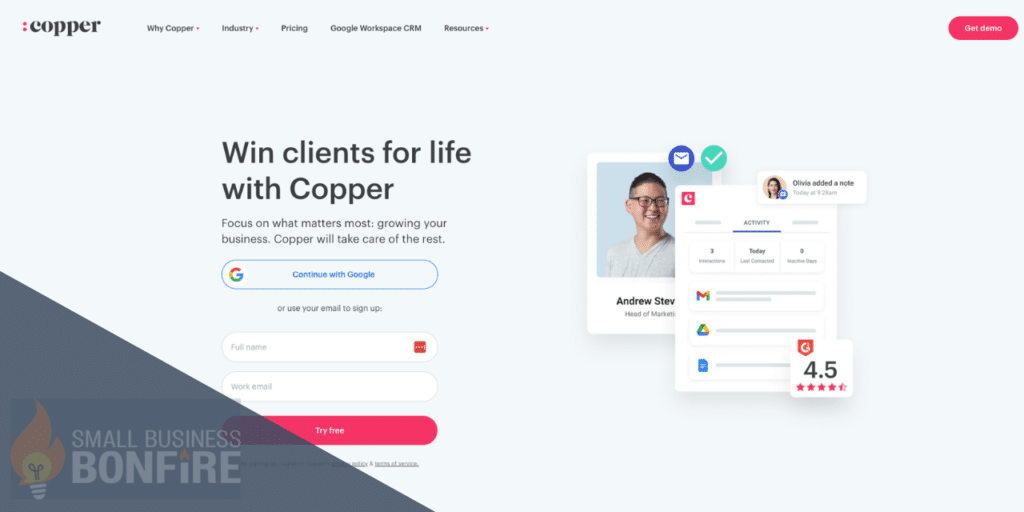
Subsequently, we have Copper CRM!
What Is Copper CRM?
Copper CRM is a Google-integrated platform that works seamlessly with Google Workspace. It boasts an intuitive interface that makes navigating and managing customer information a breeze.
Plus, the platform’s AI-powered features automate routine tasks like data entry and lead classification, freeing up marketing and sales departments’ time to focus on more important things.
To discover what the SBB team thought of this platform, here is our in-depth Copper CRM review for your reading pleasure!
Copper CRM Key Features
This CRM software is designed to help SMBs easily manage their client relationships by providing users with a boatload of features.
Some of these features include:
- Task management
- Pipeline management
- Reporting & analytics
- Sales & marketing automation
With its AI-powered algorithm and predictive lead scoring, Copper CRM can track customer communication and help businesses prioritize their leads.
Copper CRM Pros and Cons
Like the other CRM software before, the SBB team compiled a list of advantages and drawbacks for Copper CRM while testing the platform.
Pros:
- Beginner-friendly
- Affordable pricing options
- Offers third-party integrations
Cons:
- No lead-capturing forms
- Limited chat support options
Example of Copper CRM in Use
Lastly, let’s review how Copper CRM could assist an SMB.
For instance, imagine you own a small business that manufactures computer hardware and peripherals.
You can use Copper CRM to manage your customer base more efficiently by:
- Organizing contact data with custom fields
- Eliminating manual data entry with automated data capture
- Analyzing customer behavior with its AI-based lead scoring
These features can help you manage client relationships better, improve customer satisfaction, and drive sales.
So if you’re looking for CRM software tailored to an SMB’s needs, Copper CRM should be on your list!
CRM Example 7: Apptivo CRM
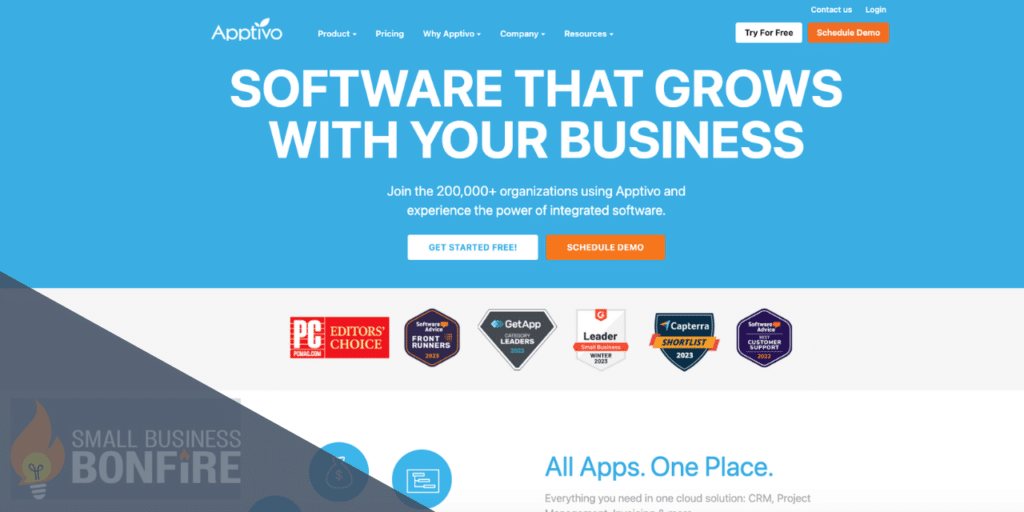
Additionally, we also reviewed Apptivo CRM!
What Is Apptivo CRM?
Apptivo CRM is an all-in-one cloud-based software perfect for SMBs looking for a powerful, easy-to-use tool to manage customer interactions.
With its user-friendly interface, this platform helps businesses automate their sales, marketing, and customer service operations, increasing productivity and growth.
Furthermore, Apptivo CRM offers affordable pricing and excellent customer support, making it an excellent choice for SMBs looking for a robust CRM that fits their budget.
Apptivo CRM Key Features
This flexible and customizable CRM offers a variety of features that cater to your specific business needs.
These features are:
- Email marketing
- Sales automation
- Lead management
- Project management
- Retail & distribution management
Plus, Apptivo CRM offers robust reporting and analytics, so you can track progress and identify areas for improvement.
With everything in one place, your team can easily collaborate and streamline workflows.
Apptivo CRM Pros and Cons
To provide you with a comprehensive review of this platform, we also devised a list of its benefits and disadvantages.
Pros:
- Free trial and demo available
- Offers premium customer support
- Provides seamless integration with other applications
Cons:
- Some advanced services are only available on its Enterprise plan
- There is a steep learning curve for users unfamiliar with the platform
Example of Apptivo CRM in Use
To wrap up our review of this platform, let’s go over how Apptivo CRM can be used in an SMB.
Let’s suppose you are in the business of selling financial services and products.
With Apptivo CRM, you can:
- Organize business data with custom fields
- Track leads with its lead management features
- Build customer relationships with its email marketing tools
This CRM platform can help you gain insights into your customers, making it easier for you to market and sell your products and services.
CRM Example 8: Zendesk CRM
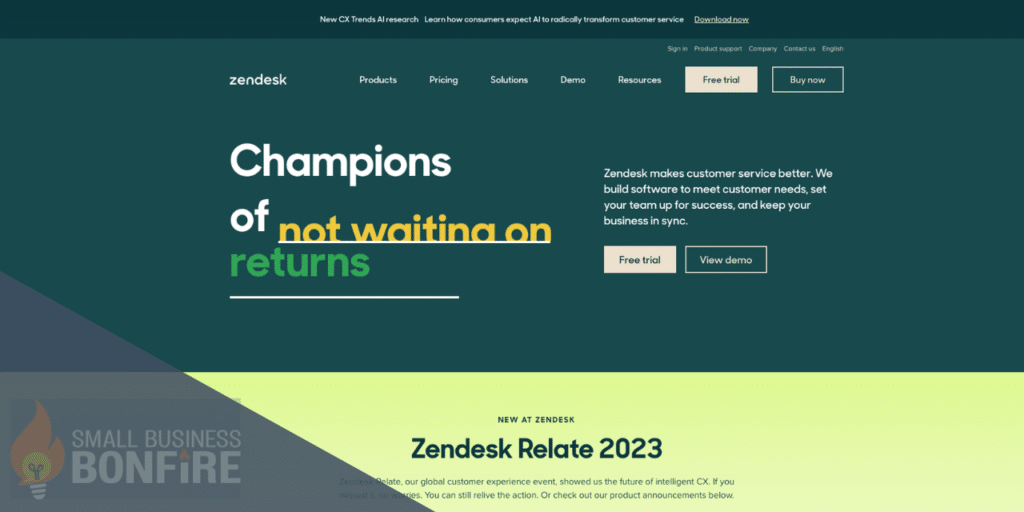
Lastly, there is Zendesk CRM!
What Is Zendesk CRM?
Zendesk CRM is a cloud-based customer relationship management solution designed to help small businesses improve their customer service and sales processes.
Its two-in-one platform is comprised of Zendesk Sell and Zendesk Service.
With this suite of software, you can easily track client information and interactions, keep team members on the same page, and create personalized experiences for your customers.
Personally, this was one of our favorite CRMs that we tested—don’t let its ranking on this list fool you. Read our all-inclusive Zendesk review if you would like to know more about this platform!
Zendesk CRM Key Features
Zendesk CRM is a robust and reliable platform packed with amazing features that cater to the needs of SMBs.
Here are some of the main features it offers:
- Email integration
- Lead generation
- AI-powered chatbots
- Multi-channel communications
Additionally, Zendesk CRM comes with an intuitive ticketing system, enabling businesses to prioritize, assign, and escalate tickets based on priority levels.
With all these features and more, Zendesk CRM is the go-to solution for any SMB looking to turn customer service into a competitive advantage.
Zendesk CRM Pros and Cons
Throughout our testing, we discovered some top benefits and drawbacks while using this platform.
Pros:
- Affordable pricing
- 24/7 customer support
- Designed for beginners
Cons:
- There is no free plan
- Limited marketing features
- Lacks customization options for chatbots
Example of Zendesk CRM in Use
To conclude, let’s look at how Zendesk CRM can help an SMB.
Let’s say you are in the business of providing online education services.
You can use Zendesk CRM to manage your clients more effectively by:
- Prioritizing tickets with its ticketing system
- Automating customer service tasks with AI-powered chatbots
- Creating personalized messages with its multi-channel communications
These features can help you build strong relationships with your customers, improving customer engagement and satisfaction.
So if you’re looking for a CRM solution that offers an all-in-one platform, Zendesk is worth considering.
What Is CRM Software (Customer Relationship Management)?
Customer relationship management software refers to the strategies and technologies businesses use to manage interactions and relationships with customers.
This can involve anything from tracking customer purchase histories to analyzing customer preferences and behaviors.
A CRM system can help businesses improve overall satisfaction, increase sales, and streamline their operations by centralizing all of this information in one place.
Why Is CRM Software Important for SMBs?
As a small to medium-sized business owner, you might think CRM software isn’t necessary for your operations. But the truth is, it’s absolutely critical.
During our testing, the SBB team took note of the many different ways a CRM can benefit an SMB.
Centralized Data Across Your Organization
One of the main benefits of CRM software is that it enables you to centralize all your consumer data, making it easy to access and analyze.
With centralized data, you can get a 360-degree view of your customers, from their purchase history and preferences to their communication with different departments within your organization.
This allows you to personalize your communications and marketing efforts and help you make data-driven decisions that lead to better customer satisfaction and increased revenue.
Improving Customer Segmentation
A CRM also allows for improved customer segmentation by dividing customers into different groups based on their preferences and demographics.
This can help you create more targeted marketing campaigns and personalize your communication with them, which can lead to enhanced customer loyalty.
Saving Time and Increasing Productivity
With a reliable CRM, you don’t have to spend hours manually entering data or tracking sales activities.
Everything gets streamlined so you can quickly access all your customer information at a glance.
This saves your business time and improves team productivity, ensuring all team members have the most up-to-date information available.
Organizing Your Customer Data
Additionally, CRMs allow you to integrate customer data and organize it more practically and systematically.
With these systems, you can communicate with customers more effectively, target them more precisely, and build stronger, mutually-beneficial relationships.
Plus, organized data means less time wasted and fewer mistakes.
Facilitating Easier Internal Communications
CRM helps facilitate more accessible internal communications between departments and team members.
By streamlining communication processes and making information accessible to everyone, it ensures that everyone is on the same page.
This results in improved collaboration, increased productivity, and fewer mistakes due to misunderstandings.
Automating Reports
These software solutions can also offer the advantage of automating reports.
This means that SMBs no longer have to compile and analyze sales reports and marketing metrics manually—the CRM software does it for them!
Providing More Accurate Business Forecasting
Moreover, CRM software can provide SMBs with more accurate business forecasting by allowing them to track and analyze interactions and purchase patterns.
This empowers business owners to anticipate future trends and tailor their sales strategies accordingly.
Managing Prospective Customer Relations
The better your relationship is with your customers, the more likely they will return and do business with you again.
That’s where a CRM can help you manage your relationship with prospective customers, keeping track of their information and automatically following up with them to keep them engaged.
Increasing Sales Team Collaboration
Another benefit of this software is increasing sales team collaboration by ensuring everyone can access the same accurate data.
Different team members can view critical information and work on a unified strategy to boost sales, improve customer experience, and generate leads.
Increasing Bottom-Line Sales
Furthermore, CRMs can provide insights into your customers’ behavior, ultimately increasing your bottom line.
By keeping track of customer preferences and purchasing history, you can offer personalized promotions and discounts to loyal customers and drive higher conversions.
Allowing Sales to Scale More Easily
Finally, CRM systems allow sales teams to scale more quickly and efficiently while also streamlining customer communication.
This gives sales reps more time to develop customer relationships and close deals.
With features like automated marketing campaigns, task management, and lead scoring, SMBs can compete with larger companies without sacrificing valuable resources.
Main CRM Features
While we were testing different CRMs, we also found that most platforms had some similar features in common.
Below are some of the main features that almost every CRM includes.
CRM Automation
One key feature is CRM automation. With this feature, businesses can easily automate tasks such as lead capturing and nurturing and email marketing campaigns.
This helps businesses save time and resources while improving customer relations.
360-View of Customer Experience
CRMs can also provide a 360-degree view of the customer journey.
This means businesses can track and analyze every interaction with customers, from the first email to the final purchase, and use that data to improve the overall customer experience.
Customer Data Alignment
Additionally, customer data alignment is vital to CRMs, ensuring that all consumer information is up-to-date, accurate, and consistent across all departments.
This way, businesses can offer a seamless and specialized customer experience that builds trust and loyalty.
Personalized Customer Experience
CRMs enable businesses to store consumer data, track interactions, and gain insights into customer preferences and behaviors.
With this information, businesses can craft customized campaigns, create targeted sales pitches, and offer personalized recommendations to each customer.
This level of personalization not only improves consumer satisfaction but also boosts customer loyalty and retention.
Data Tracking
Another valuable feature is data tracking, which allows businesses to collect, store, and analyze customer data.
This information allows business owners to gain insights into their customers’ behavior, preferences, and needs, which enables them to personalize communications and campaigns, ultimately resulting in stronger relationships and increased sales.
Analytics & Reporting Tools
Furthermore, CRMs often have analytics and reporting tools that allow SMBs to analyze data regarding customer preferences, behavior, and trends.
These tools can help business owners make data-driven decisions, create targeted marketing campaigns, and improve customer engagement.
Sales Pipeline Management
Lastly, CRMs can help streamline the sales pipeline management process.
With this functionality, SMBs can easily monitor the customer lifecycle by tracking leads, deals, and sales opportunities while also automating their sales activities.
Start Your CRM Journey Today
In today’s competitive market, where customer service and satisfaction can make or break your business, having an efficient and effective CRM solution can help you stay ahead of the pack and grow your business.
After reviewing the eight most powerful CRM examples, you have various options to choose from based on your specific business needs.
With the right CRM software, improve your workflow, enhance customers’ satisfaction, and drive growth and success.
Are you looking for a CRM for your SMB?
Do you have any questions about the CRM examples listed in this review? Let’s continue the conversation in the comments below!
The post CRM Examples: 8 Powerful CRM Reviewed appeared first on Small Business Bonfire.
The post originally appeared on following source : Source link

